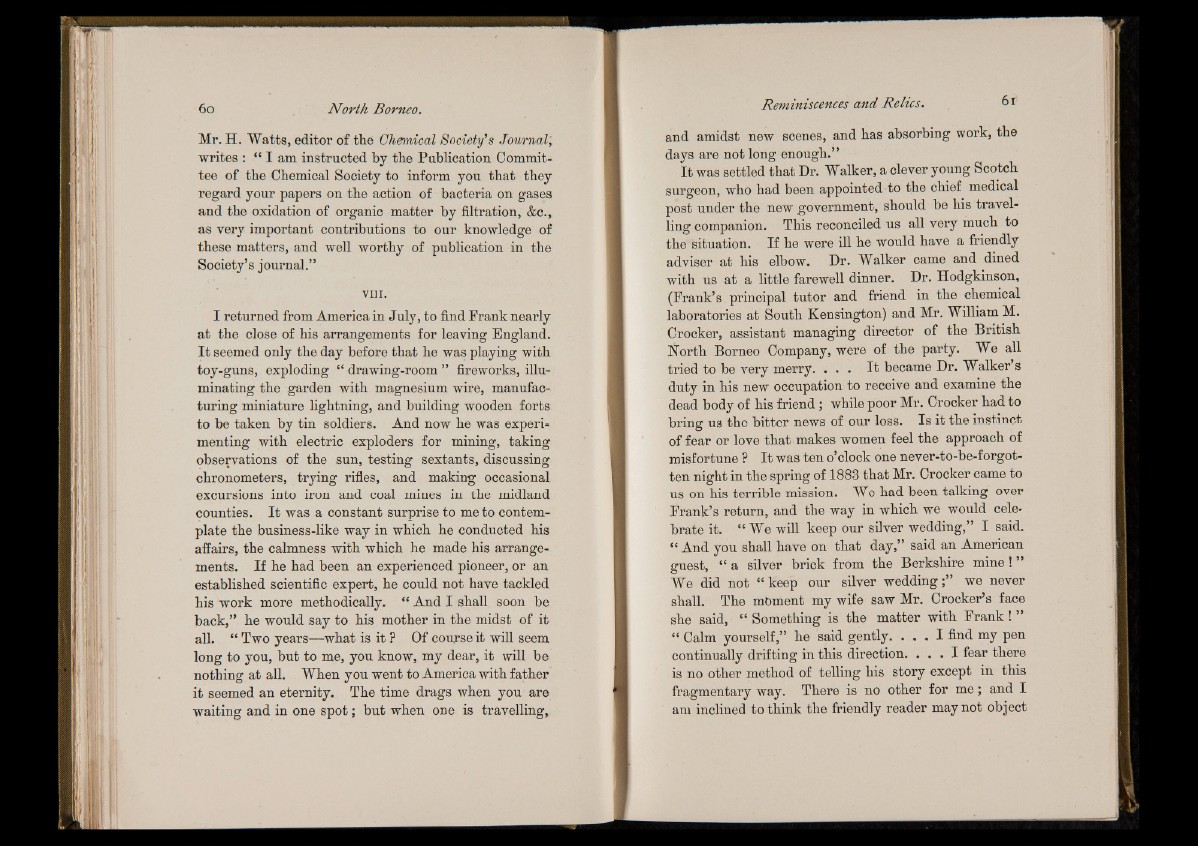
Mr. H. Watts, editor of the Chemical Society’s Journal',
writes : “ I am instructed by the Publication Committee
of the Chemical Society to inform you that they
regard your papers on the action of bacteria on gases
and the oxidation of organic matter by filtration, &c.,
as very important contributions to our knowledge of
these matters, and well worthy of publication in the
Society’s journal.”
VIII.
I returned from America in July, to find Frank nearly
a t the close of his arrangements for leaving England.
I t seemed only the day before that he was playing with
toy-guns, exploding “ drawing-room ” fireworks, illuminating
the garden with magnesium wire, manufacturing
miniature lightning, and building wooden forts
to be taken by tin soldiers. And now he was experimenting
with electric exploders for mining, taking
observations of the sun, testing sextants, discussing
chronometers, trying rifles, and making occasional
excursions into iron and coal mines in the midland
counties. I t was a constant surprise to me to contemplate
the business-like way in which he conducted his
affairs, the calmness with which he made his arrangements.
If he had been an experienced pioneer, or an
established scientific expert, he could not have tackled
his work more methodically. “ And I shall soon be
back,” he would say to his mother in the midst of it
all. “ Two years—what is it ? Of course it will seem
long to you, but to me, you know, my dear, it will be
nothing at all. When you went to America with father
it seemed an eternity. The time drags when you are
waiting and in one sp o t; but when one is travelling,
and amidst new scenes, and has absorbing work, the
days are not long enough.”
I t was settled that Dr. Walker, a clever young Scotch
surgeon, who had been appointed to the chief medical
post under the new government, should be his travelling
companion. This reconciled us all very much to
the situation. If he were ill he would have a friendly
adviser at his elbow. Dr. Walker came and dined
with us at a little farewell dinner. Dr. Hodgkinson,
(Frank’s principal tutor and friend in the chemical
laboratories at South Kensington) and Mr. William M.
Crocker, assistant managing director of the British
North Borneo Company, were of the party. We all
tried to be very merry. . . . I t became Dr. Walker’s
duty in his new occupation to receive and examine the
dead body of his friend; while poor Mr. Crocker had to
bring us the bitter news of our loss. Is it the instinct
of fear or love that makes women feel the approach of
misfortune ? I t was ten o’clock one never-to-be-forgotten
night in the spring of 1883 that Mr. Crocker came to
us on his terrible mission. We had been talking over
Frank’s return, and the way in which we would celebrate
it. “ We will keep our silver wedding,” I said.
“ And you shall have on that day,” said an American
guest, “ a silver brick from the Berkshire mine ! ”
We did not “ keep our silver wedding;” we never
shall. The moment my wife saw Mr. Crocker’s face
she said, “ Something is the matter with F ra n k ! ”
“ Calm yourself,” he said gently. . . . I find my pen
continually drifting in this direction. . . . I fear there
is no other method of telling his story except in this
fragmentary way. There is no other for me; and I
am inclined to think the friendly reader may not object